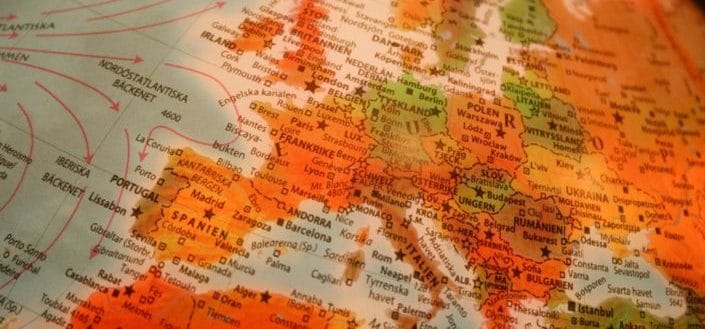
via: Pexels / Tembela Bohle
The World Cup is the cosmic event that helps the majority of Americans realize that soccer exists as a professional sport.
The tournament is put on by FIFA every 4 years. Over the span of a month, 32 national teams compete in 64 matches to win the claim and title of the best soccer team in the world.
The Cup is one of the greatest sporting events in existence. Its status and global presence creates a competition wrought with endless stress and excitement for both the players and fans.
17 Amazing World Cup Facts

via: Unsplash / Toni Koraza
For the month of the iconic event, headlines are dominated by World Cup stories and countless related records and statistics.
Below are some of the most amazing and incredible World Cup facts that, unless you’re an absolute soccer fanatic, you don’t know.
1. No Sex (Especially Acrobatic Sex) During the World Cup

via: Unsplash / Toa Heftiba
Many coaches ban their players from having sex during the World Cup.
Coaches from teams including Germany, Spain, Mexico and Chile have all forbidden their players from having sex during the tournament. The mangers claim sex is a distraction and a waste of the player’s energy.
Other managers, like Brazil’s Luiz Felipe Scolari, have taken a more mixed approach. When asked his stance, he stated his players can have sex but are to abstain from more “acrobatic” forms of sex. To be honest, I’m not sure what defines acrobatic sex. I’m a little disappointed in the reporters for not asking such an important follow up question…
Thankfully for our boys, USA’s coach, Jurgen Klinsmann, declared that he won’t ban players from sexual activities during the Cup.
2. Almost 50% of the World’s 7.05 Billion People Watch the Cup

via: Unsplash / Emma Dau
Almost 3.2 billion people worldwide, roughly 46% of the world’s population, watched more than one minute of the 2010 World Cup. According to FIFA, this makes the tournament “the world’s most widely viewed sporting event.”
While it’s amazing that 46% of the world united to watch a single event, it’s arguably more incredible that 2 billion people, or about 29% of the world, sat down to watch more than 30 minutes of the Cup.
To put things into perspective, let’s compare viewership of the 2014 Super Bowl to the final match of the 2010 World Cup. The Seahawk’s win over the Broncos was seen by 111.5 million people while Spain’s 2010 victory had over 909 million viewers.
I realize that as the Super Bowl is a predominantly US event and the World Cup is a worldwide tournament, this is somewhat comparing apples to oranges. Even still, the fact that almost a billion people watched a single soccer match is mind blowing.
For those who are curious, the viewership stats were drawn from this report by FIFA.
3. Over 3 Million Beers Drank, Almost 400,000 Brauts Devoured

via: Unsplash / Rhett Wesley
Over 750,000 liters of beer were sold in stadiums during the 2010 South Africa World Cup. That’s equivalent to 25,360,517 ounces or 3,170,064 beers!
Don’t worry, since these guys also ate 390,600 hot dogs, they won’t get too hung over.
I’m equal parts offended and impressed by this stat.
4. $35 Million Dollar Payout for the Winner

via: Unsplash / Olga DeLawrence
One of the most interesting World Cup facts is how much money FIFA pays the tournament’s participants.
In addition to bragging rights, the winner of the World Cup takes home a staggering $35 million dollars. In a small attempt to offset their disappointment, FIFA awards the runner-up $25 million. I assume each and every team who placed second would trade the money for the title.
The top placing teams of most tournaments receive some sort of compensation. What’s incredible about the World Cup is that every team who participates takes home a multi-million dollar check. In fact, just competing in group play secures your team $8 million dollars.
FIFA's generous disbursements make a little more sense when you consider how much they rake in. For the 2014 World Cup, they’re projected to make around $4 billion dollars. Not bad for a month long tournament.
5. The Cup Causes Increased Birth Rates in Host Countries

via: Unsplash / Patricia Prudente
Nine months after Germany hosted the World Cup in 2006 their country’s birthrate increased more than 10 percent.
A 10 percent increase may not seem like much, but birth rate is something that’s extremely stable. Since 2006, the European Union birthrate has only changed .07%. What’s more, Germany’s birth is one of the lowest in the EU.
So why did this happen? Well, there are two fundamental reasons:
- Beer
- The fun nature and excitement of the World Cup. Fun and exciting events tend to make people happier. When women are happy, it releases hormones that make it easier to get pregnant.
6. The Stadiums are Thousands of Miles Apart

via: Unsplash / Shai Pal
Contrary to how it may seem, and opposite to other global events like the Olympics, the World Cup stadiums are usually spread widely across the host country.
As an example, the twelve stadiums of the 2014 World Cup are spread as far as 1,997 miles apart. That almost 2,000 mile journey, from Porto Alegre to Fortaleza, takes the teams roughly five and a half hours.

via: Unsplash / Annie Spratt
You can see the locations of the twelve stadiums below. There’s also a great video flyover of the stadiums you can watch here.
7. The 2014 World Cup in Brazil is the Most Expensive Put on So Far, By a LOT

via: Pexels / Anna Kapustina
Bloomberg estimates Brazil will spend more than 30 billion reals (or $14.5 billion dollars) to host the World Cup.
If this ridiculously high dollar amount doesn't blow your mind, compare Brazil’s $14.5 billion dollar price tag to the cost of the last five tournaments combined of $15.37 billion dollars. Amazingly, Brazil spent almost as much on one tournament as the past five countries spent on the five tournaments. A breakdown of the costs can be seen below.
1994 (US) - $30 million
1998 (France) - $340 million
2002 (Japan/South Korea) - $5 billion
2006 (Germany) - $6 billion
2010 (South Africa) - $4 billion
Plenty of Brazilians are pretty mad about the large amount of money their government spent to host the tournament. While fourteen and a half billion dollars is an astronomical figure, hosting the World Cup does have its financial benefits. The same Bloomberg report linked above projects that Brazil’s GDP will increase 0.4 percent every year for the next 5 years.
8. European Countries Have Appeared in All but Two World Cup Final Matches

via: Unsplash / Calvin Hanson
Of the 19 FIFA World Cup tournaments held (excluding the current 2014 tournament in Brazil) a European team has appeared in the all but two of the final matches.
Of the 17 finals matches that they've appeared in, European teams have won 58.8%.
9. Two Teams Have Won Almost 50% of the Tournaments

via: Unsplash / Fauzan Saari
Brazil and Italy have a combined 9 World Cup titles. One of these two teams has won 47% of the 19 tournaments held.
Brazil has won the most titles with 5 wins, ranging from 1958 to 2002. The Brazilians have appeared in every World Cup since its inception back in 1930.
Italy has taken home 4 titles making them the second most winning country. Their victories range from 1934 to 2006.
Germany comes in third with 3 wins, followed by Argentina and Uruguay with 2 wins apiece.
Those five teams combine to a total of 15 wins. That means that of the 195 countries that the United States government recognizes as independent nations, 5 have won roughly 79% of the World Cup tournaments held.
10-13. Most Goals Scored By

via: Unsplash / Lars Bo Nielsen
10: A Player in a Single Match
Russian striker Oleg Salenko holds the record for most goals scored in a single World Cup match. In 1994 during a group game versus Cameroon, Salenko knocked in five goals. His 5 goals helped Russia comfortably win the match at 6:1.
11: A Team in a Single Match
Hungary takes the prize for most goals scored by a team in single World Cup match. In 1982, they made 10 goals to beat El Salvador in a group game 10:1.
12: A Player in One World Cup Tournament
French striker Just “Justo” Fontaine claims the record for most goals scored in a single World Cup tournament. He knocked in an unbelievable 13 goals in just 6 goals played.
To illustrate just how amazing this was, consider Ronaldo’s and Klose's joint record for the most goals scored in playing multiple World Cup tournaments below.
13: A Player in Multiple World Cup Tournaments
Brazilian “phenomenon” Ronaldo and Germany’s Miraslov Klose jointly hold the record for most goals scored in multiple World Cup tournaments. Both players have manage to slip 15 goals past the keeper.
Ronaldo, who is also one of the only three players to win the FIFA World Player of the Year three or more times, was able to achieve the record a little more quickly. It took the phenomenon 19 matches in 3 World Cup tournaments while it took Klose 20 matches in 4 different tournaments.
14-15. The Fastest Goal vs. the Quickest Red Card

via: Unsplash / Artur Łuczka
In the 2002 World Cup, Turkey’s Hakan Sukur scored a goal in just 11 seconds. The goal helped the Turks defeat South Korea 3:2 and finish the tournament in 3rd place.
At an unbelievable 11 seconds, Sukur holds the record for fastest goal scored in a World Cup match.
In what's arguably the exact opposite end of the spectrum, Uruguayan defender Jose Batista holds the proud record of the fastest red card in World Cup History. He was sent off just 56 seconds into the match after he committed a high studded slide tackle to the back of the legs of Scottish midfielder Gordon Strachan.
Even with over 89 minutes of playing a man down, Uruguay was able to hold on and tie the match at 0:0. Check out the slide tackle below.
16. The Organizers: FIFA

via: Pexels / Gustavo Fring
A list of world cup facts would be horribly incomplete without mentioning FIFA.
FIFA is short for the Fédération Internationale de Football Association (International Federation of Association Football in English). FIFA was founded in 1904 and is governed by Swiss law. Accordingly, the association is headquartered in Zurich.
FIFA’s claim, “For the Game. For the World,” is backed by their three pillared mission statement:
- To develop football everywhere and for all
- To organize inspiring tournaments
- To care about society and the environment
With 209 member countries, FIFA is often called the “United Nations of Football.”
Their accolades and mission statement aside, their reputation is far from spotless. The organization has been called dishonest and corrupt. There are multiple scandals surrounding the organization including allegations of bribery.
17. Does Hosting the Match Improve a Country's Global Image?

via: Unsplash / Edgar Chaparro
When asked if they thought the World Cup would improve their country’s image, Brazilian citizens were divided.
In a study done by Pew Research, 39% of participants said they felt the tournament will hurt the country’s image, 35% said it would improve the image, 23% thought it wouldn't have an impact and 3% said they didn't know.
In Conclusion
This handful of World Cup facts doesn't begin to demonstrate the event’s greatness.
Money, politics and host country image aside, the World Cup is a sporting event that is unrivaled. So contrary to my normal advice on the subject go inside, hit the couch, turn on the TV and share in the global experience that is the World Cup.

